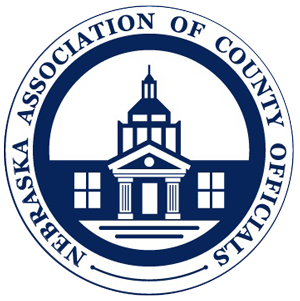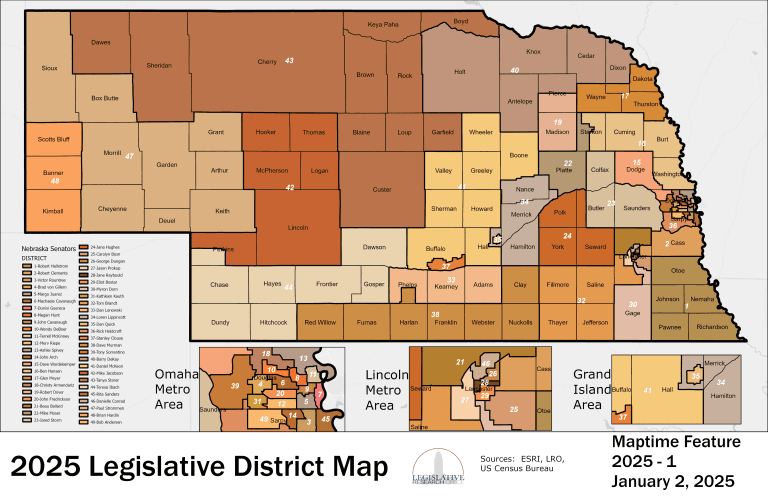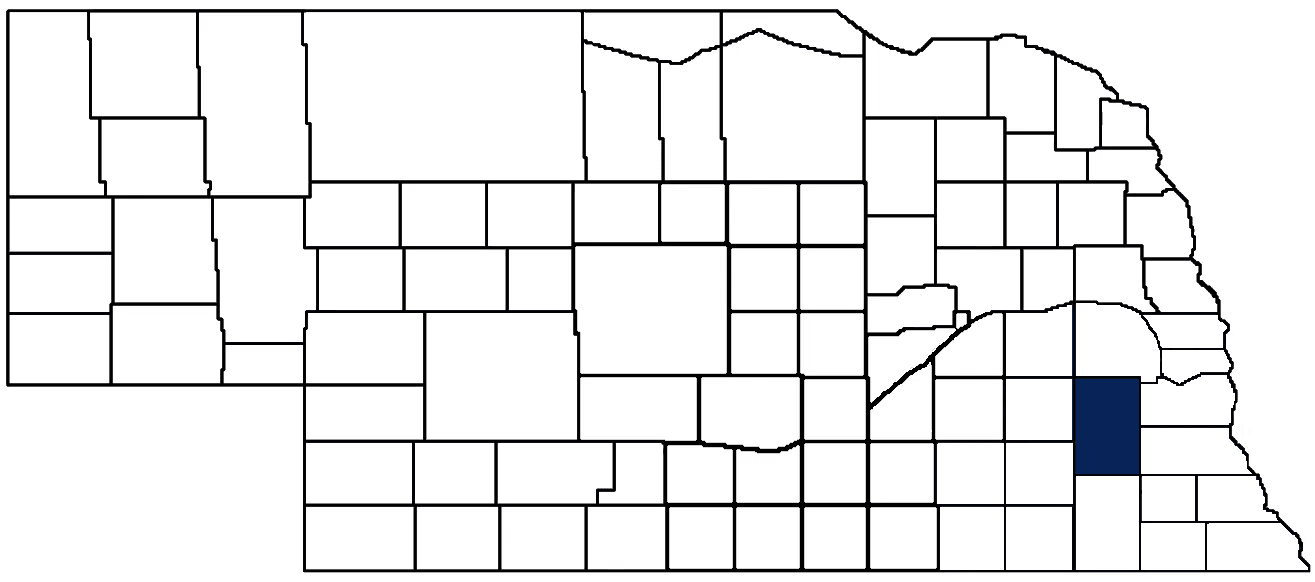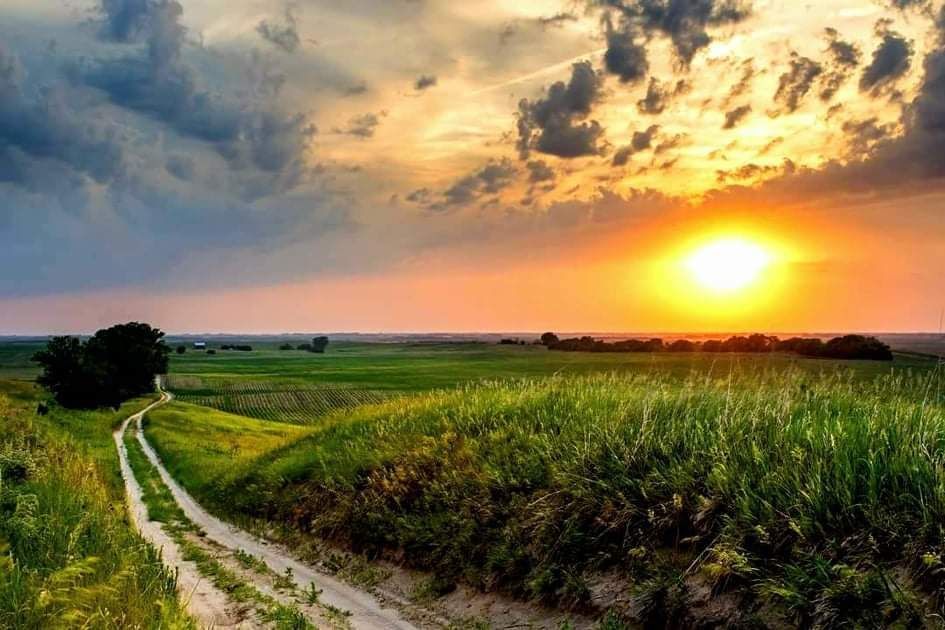- General Info
- Demographics
- Education and Employment
- Valuation and Taxes Levied
- State Senators
- History
- County Programs
- Other Information
Communities and Development
Lancaster County Seat: Lincoln
Total County Population: 322,608
- Cities (pop. & class): Hickman (2,607 • 2nd Class), Lincoln (291,082 • Primary Class), Waverly (4,279 • 2nd Class)
- Villages (pop.): Bennet (1,082), Davey (135), Denton (189), Emerald (45), Firth (649), Hallam (268), Kramer (26), Malcolm (457), Panama (235), Raymond (159), Roca (201), Sprague (136)
- Unincorporated Pop. (% of county pop.): 20,908 (6%) 2020
Land Development (% of total land in county):
- Agriculture: 66%
- By method: Dryland (row crop/grain/forage) (49%); Pasture (pure grassland) (13%); Irrigated (row crop/grain/forage) (4%) • Neb. Dept. of Rev. - total equals agriculture's %
- By commodity: Corn 27%, Soybeans 27%, Livestock (grassland) 18%, Other Hay 2%, Alfalfa 1% • USDA - equals agriculture's % plus some wetlands (1%) and minus public grassland/wetlands and reserve
- Residential, Commercial, Industrial, Conservation Reserve & Exempt (combined): 34% 2022
County Offices
Courthouse Address and Hours:
575 South 10th Street
Lincoln, Nebraska 68508
M-F 8:00 am - 4:30 pm
Complete list of county board members
County Board Meetings: Every Tuesday
View the County's Government Maps
NACO District: Southeast
Click for a live look at Lancaster County (9th St. & N St. in Lincoln)
General
Population: 322,608
Land area (sq. mi.): 837.56
Population per square mile: 385.20
Race and Age
Race 2020
White: 78.1%
African American: 4.1%
American Indian: 0.5%
Asian: 4.3%
Hispanic: 8.0%
Native Hawaiian and Pacific Islander: 0.1%
Two or More Races: 4.4%
Age 2020
0-17: 22.5%
18-64: 62.7%
65+: 14.9%
Households
Total households: 127,884 2020
With one child: 15,740 2022
With 2+ children: 21,090 2022
With seniors (65+): 27,910 2022
Socioeconomics
Median household income: $72,625 2023
% of Population in Poverty: 12.5% 2023
# of Housing Units: 153,484 2020
Owner-occupied rate: 59.2% 2020
Median home price: $297,060 Q4 2024
2024 building permits for detached single family homes: 1,029
2024 building permits for non-detached housing units: 911 (townhouse, duplex, or apt. unit)
Technology
Access to broadband (100 Mbps via fiber or cable modem): 96.0% 2021
Sources: National Association of Realtors, Nebraska Department of Revenue, Nebraska Legislature, Nebraska Library Commission, U.S. Bureau of Economic Analysis, U.S. Census Bureau (building permits), U.S. Census Bureau (demographics), U.S. Census Bureau (municipalities)
Employment, Schools, and Child Care
Unemployment rate: 2.6% March 2025
County Employment Website: https://www.governmentjobs.com/careers/lincolnne
High school graduate or higher: 93.2% 2020
School Districts: Crete Public Schools, Freeman Public Schools, Lincoln Public Schools, Malcolm Public Schools, Milford Public Schools, Norris School District 160, Palmyra District OR1, Raymond Central Public Schools, Waverly School District 145, Wilber-Clatonia Public Schools
Bachelor's degree or higher: 39.8% 2020
Community College Service Area: Southeast Community College
Countywide child care capacity: 404 providers; 21,969 children 2024
Find child care: For a list of child care providers in your zip code, visit Nebraska DHHS or the Nebraska Resource and Referral System.
Lancaster County Economy
Annual Gross Domestic Product (GDP): $26,934,845,000 2023
Nonfarm Small Business Receipts: $3,827,794,439 2022
Nonfarm Wage Income: $8,435,321,000 2022
Farm and Ranch Commodity Sales Receipts: $264,266,000 2022
Farm and Ranch Operations (Non-Sales) Receipts: $22,653,000 2022
- For components of nonfarm small business receipts, nonfarm wage income, and farm & ranch commodity sales and operations receipts, see "Notes" below.
Grain Elevators by Location (bushel capacity):
- Bennet: Frontier (1,403,917)
- Emerald: Farmers (1,279,013)
- Firth: Farmers (540,615)
- Hallam: Farmers (1,740,597)
- Kramer: Farmers (908,074)
- Lincoln: ADM (6,707,000), ADM (5,072,000), Farmers (8,493,739), Frontier (1,605,974), Gooch Mill (3,477,000), Hansen-Mueller (12,592,000)
- Martell: Frontier (55,422)
- Prairie Home: Frontier (178,059)
- Raymond: Farmers (2,061,758)
- Walton: Frontier (685,332)
- Waverly: Frontier (3,171,046)
- (1 bushel = 56 lbs. corn/sorghum, 60 lbs. soybeans/wheat; % max. moisture = 18% beans, 15.5% corn, 14% sorghum/soybeans, 13.5% wheat)
Railroad Miles: 150.46 main, 186.88 side
- Places with Railroad Service: Bennet, Berks, Firth, Hallam, Garratt, Hickman, Lincoln, Raymond, Roca, Waverly
Local Grain Market: Click for today's grain prices in Lancaster County
Cattle Producers: 319
- Pastureland Cash Rent (avg.): $46/acre/yr 2024
Crop Producers: 161
- Dryland Cash Rent (avg.): $187/acre/yr 2024
- Irrigated Land Cash Rent (avg.): $297/acre 2024
Dairy Producers: 5
Farmers Markets:
- Lincoln Haymarket Farmers Market (May - October, Saturdays 8 a.m. - 12 p.m.)
- Bennet Farmers Market (May 5 - September, Wednesdays 4 - 7 p.m.)
- East Campus Farmers Market (June 12, July 10 & Aug. 14, Saturdays 10 a.m. - 2 p.m.)
- Hickman Farmers Market (May - September, Saturdays 9 a.m. - 11 a.m.)
- Holiday Harvest Farmers Market (November 8, 22 and December 6 & 20, Sundays 10 a.m. - 2 p.m.)
- Hub Cafe Micro Market (May - September; Wednesdays 5 - 7 p.m.)
- Jazz in June Market (Lincoln) (June, Tuesdays 5 - 8:30 p.m.)
- Sunday Farmers Market at College View (Lincoln) (April 24 - October 30, Sundays 10 a.m. - 2 p.m. (Special Hours May 8, 3 p.m. - 6 p.m.)
- Thursday Farmers Market in Fallbrook (June - October, Thursdays 4 - 7 p.m.)
Electricity Providers: City of Bennet (Nebraska City Utilities), City of Hickman, Lincoln Electric System, Norris PPD
Irrigation and Drinking Water
Rural Irrigation Wells: 388 2024
Rural Livestock Wells: 39 2024
Rural Commercial/Industrial Wells: 50 2024
Rural Drinking Water Wells: 3,070 2024
Drinking Water Utility Connections: 84,757 Residential; 5,103 Commercial; 16 Industrial 2024
Surface Water Diversions (Irrigation): 246 2024
Click for real time:
Streamflow data on all creeks in Lancaster County
Groundwater level data near Firth (0.25 mi. south of Firth)
Groundwater level data near Roca (0.25 mi. west of Roca)
Notes
Lancaster County Economy
- Nonfarm small business receipts are reported by partnerships and sole proprietorships. They do not include receipts reported by cooperative associations.
- Nonfarm wage income is reported based upon the wage earner's residential address; therefore, it also includes wages earned by Lancaster County residents in other counties or states, but it excludes wages earned in Lancaster County by residents of other counties or states.
- Nonfarm wage income excludes wages earned by anyone claimed as a dependent.
- Farm and ranch commodity sales receipts and operations receipts are reported based upon the farm or ranch owner's principal county of operations; therefore, those figures also include receipts reported by producers operating principally in Lancaster County for their production in other counties or states, but the figures exclude receipts reported for production in Lancaster County by producers operating principally in other counties or states.
Irrigation and Drinking Water
- A rural irrigation well is any well intended for irrigating crops that, either on its own or as part of a set of commingled wells, is capable of pumping more than fifty (50) gallons of water per minute (gpm). Note that some rural commercial/industrial wells are also capable of pumping more than 50 gpm. In Nebraska, the owner of any well--or set of commingled wells--that is capable of pumping more than 50 gpm must register the well(s) with the state government and have a permit for the well(s) from the local natural resource district (NRD).
- Rural livestock wells and rural drinking water (also known as "domestic") wells are not allowed to pump more than 50 gpm unless permitted by the local NRD. Each rural drinking water well usually serves one single family home, though in rare cases a rural drinking water well serves multiple homes.
- Data on rural livestock wells and rural drinking water wells may be incomplete for wells drilled prior to September 9, 1993. State law does not require wells drilled prior to that date to be registered with the state government if the wells are not capable of pumping more than 50 gpm. Neb. Rev. Stat. § 46-735; see Laws 1993, LB 131, § 25.
Sources: National Agricultural Statistics Service (USDA), Nebraska Cooperative Council, Nebraska Coordinating Commission for Postsecondary Education, Nebraska Department of Health and Human Services, Nebraska Department of Revenue, Nebraska Department of Transportation, Nebraska Office of the CIO, Nebraska Power Review Board, Nebraska Public Service Commission, U.S. Bureau of Economic Analysis, U.S. Bureau of Labor Statistics, U.S. Census Bureau, U.S. Energy Information Administration, U.S. Department of the Treasury (IRS), Warehouse and Commodity Management Division (USDA)
2024 Levies and Valuation
County levy rate: $0.2223 per $100 of taxable valuation
County property taxes levied: $95,457,225
Total local government property taxes levied: $730,372,711
Total countywide taxable valuation: $42,931,645,058
Federal PILT payment to Lancaster County (FY2024): $24,861 regarding 7,426 federally-owned acres
Click here for all levy rates in Lancaster County
County Levy and Taxation Laws
Levy limits
Since 1996, counties and other political subdivisions have been subject to the levy limits listed in Neb. Rev. Stat. § 77-3442 and Neb. Rev. Stat. § 77-3443.
Statutes and regulations
Nebraska Revised Statutes (Chapter 77)
Nebraska Administrative Code (Title 350)
Local tax reductions, exemptions, and credits
Neb. Rev. Stat. § 76-902(5)(a) (Deed "stamp tax" exemption): "The [stamp tax] shall not apply to: ... (5)(a) Deeds between spouses, between ex-spouses for the purpose of conveying any rights to property acquired or held during the marriage, or between parent and child, without actual consideration therefor."
Neb. Rev. Stat. § 77-201(2) (Valuation of agricultural land and horticultural land): "Agricultural land and horticultural land as defined in section 77-1359 shall constitute a separate and distinct class of property for purposes of property taxation, shall be subject to taxation, unless expressly exempt from taxation, and shall be valued at seventy-five percent of its actual value, except that for school district taxes levied to pay the principal and interest on bonds that are approved by a vote of the people on or after January 1, 2022, such land shall be valued at fifty percent of its actual value."
Neb. Rev. Stat. § 77-6703(1) (Tax credit for school district taxes paid): "(1) For taxable years beginning or deemed to begin on or after January 1, 2020, under the Internal Revenue Code of 1986, as amended, there shall be allowed to each eligible taxpayer a refundable credit against the income tax imposed by the Nebraska Revenue Act of 1967 or against the franchise tax imposed by sections 77-3801 to 77-3807. The credit shall be equal to the credit percentage for the taxable year, as set by the department under subsection (2) of this section, multiplied by the amount of school district taxes paid by the eligible taxpayer during such taxable year."
Sources: Nebraska Department of Revenue
State Senator: Robert Clements (District 2)
Committees:
- Appropriations
- Nebraska Retirement Systems
- Reference
- Building Maintenance
- Executive Board
- Legislative Performance Audit
- Legislature's Planning Committee
Map and statistics for Legislative District 2
State Senator: Beau Ballard (District 21)
Committees:
- Health and Human Services
- Nebraska Retirement Systems
- Transportation and Telecommunications
- Reference
- Executive Board
- Statewide Tourism And Recreational Water Access and Resource Sustainability (LB406)
Map and statistics for Legislative District 21
State Senator: Carolyn Bosn (District 25)
Committees:
- Judiciary
- Transportation and Telecommunications
- Committee On Committees
- Justice Reinvestment Oversight (LB605)
Map and statistics for Legislative District 25
State Senator: George Dungan (District 26)
Committees:
- Banking, Commerce and Insurance
- Revenue
- Interstate Compact for Adult Offender Supervision
Map and statistics for Legislative District 26
State Senator: Jason Prokop (District 27)
Committees:
- Appropriations
- Justice Reinvestment Oversight (LB605)
Map and statistics for Legislative District 27
State Senator: Jane Raybould (District 28)
Committees:
- Agriculture
- Business and Labor
- Natural Resources
- State-Tribal Relations
- Statewide Tourism And Recreational Water Access and Resource Sustainability (LB406)
Map and statistics for Legislative District 28
State Senator: Tom Brandt (District 32)
Committees:
- Natural Resources
- Transportation and Telecommunications
- Committee On Committees
- Building Maintenance
- Statewide Tourism And Recreational Water Access and Resource Sustainability (LB406)
Map and statistics for Legislative District 32
State Senator: Danielle Conrad (District 46)
Committees:
Map and statistics for Legislative District 46
Map of all districts in the Nebraska Unicameral Legislature
Lancaster County History
Number of Registered Historic Places: 106
Year Authorized: 1859
Year Organized: 1859
Etymology: Lancaster, England (possibly also Lancaster, Pennsylvania)
Salt Creek is the often-overlooked historical cornerstone of Lancaster County. Though a few settlers had passed through and built temporary camps in the 1850’s, the first enduring communities sprang up along the tributary that runs south-north through the county. Salt Creek was also the border dividing Pawnee territory in the west from Otoe territory in the east, and the early days of Lancaster County were marked by conflicts between Native American tribes. The creek offered not only water and shelter, but as its name suggests, salt, which several companies mined and sold.
In 1859, the Legislature established Lancaster County and its first boundaries. The county was named for Lancaster, England, but also possibly for Lancaster, Pennsylvania. The village of Lancaster, founded along the marshes of Salt Creek, was named county seat. In 1864, the Legislature dissolved and divided Clay County between Lancaster and Gage County, increasing both counties by approximately one-third.
The creation and expansion of Lancaster County confirmed Nebraska’s surging population in southeast and southcentral Nebraska. In 1867, following Nebraska’s declared statehood, the Legislature initiated measures to move the state capital from Omaha to Lincoln (then called Lancaster). The move was an attempt to prevent the growing southern territory from becoming annexed to Kansas. Such action was divisive. Those in Omaha wishing to retain the state capital renamed the village of Lancaster to Lincoln (after President Lincoln, who had been assassinated in 1865), attempting to play upon the theorized Confederate sympathies of those living south of the Platte River. The strategy was unsuccessful, and Lincoln assumed the state capital in 1867, despite having only 30 residents at the time. Lancaster County began to grow rapidly. In 1860, approximately 150 residents called Lancaster County home, but by 1880, the county was approaching 30,000 people. The population grew exponentially as it quickly emerged as Nebraska’s second most populous county.
Today, Lancaster County is home to not only the three branches of state government, but also several colleges and universities (including the University of Nebraska-Lincoln), historical museums, thousands of businesses, and nearly five hundred agricultural producers.
Highlight an important program in your county in this space! Send an email to:
Local Highlights
License Plate Number: 2 (Legacy plate)
Time Zone: Central
Number of Veterans: 17,466 2023
Zoned County: Yes
Number of County-Owned Bridges: 288
Number of County-Owned Dams: 2
Election Data
General Election Turnout: 78% 2024
Total Registered Voters: 206,568 2024
Number of Precincts: 198 2022
Number of Election Day Polling Places: 141 2022
Land Area per Polling Place (avg.): 6.00 sq. miles
Intergovernmental Data
Emergency Mgt. Planning, Exercise and Training (PET) Region: Southeast
Natural Resource Districts: Lower Platte South NRD, Nemaha NRD
State Lands (acres): Bluestem SRA (440.59), Bluestem WMA (365.22), Branched Oak SRA (2,894.86), Branched Oak WMA (2,865.56 Lancaster & Seward), Conestoga Lake SRA (315), Conestoga Lake WMA (396.21), Hedgefield WMA (114.62), Helmuth Public Access Area (120), Jack Sinn Memorial WMA (1,615.72 Lancaster & Saunders), Kildeer WMA (89.54), Lincoln Rest Area WB (33), Little Salt Creek WMA (256.53), Little Salt Creek West WMA (219.99), Olive Creek SRA (247.50), Olive Creek WMA (365.73), Saline Meadows Public Access Area (242), Stagecoach WMA (207.50), Stagecoach Lake WMA SRA (400), Teal WMA (93.34), University of Nebraska-Lincoln (873), Wagon Train SRA (568), Wagon Train WMA (464.50), Wildwood WMA (491), Yankee Hill WMA (938)
Sources: Nebraska Department of Transportation, Nebraska Emergency Management Agency, Nebraska Game & Parks Commission, Nebraska Legislature, Nebraska Office of the CIO, Nebraska Secretary of State, U.S. Department of Veterans Affairs, U.S. National Archives and Records Administration (eCFR)



